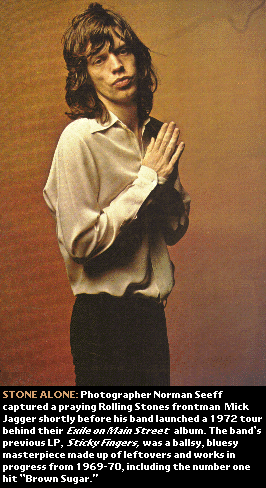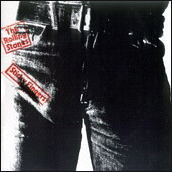|
"Brown Sugar" The Rolling Stones Rolling Stones 19100 May 1971 Billboard: #1
Mick Jagger, Keith Richard (reverting to a singular last name), Charlie Watts and Bill Wyman underscored that status by leaving England and setting up housekeeping in the south of France. The move was prompted by Britain's exorbitant tax laws, which sliced over 90 per cent of their income into the crown's pot. With more of their earnings in their pockets, the Stones came to enjoy the emigre life. Epitomizing their ascendancy to respectability was the wedding of Mick Jagger to Bianca Perez Mora Macias, a Nicaraguan beauty with ambassadorial roots on both sides of her family tree. Among the luminaries who attended the civil ceremony at the Hotel de Ville in St. Tropez on May 12, 1971, were Paul and Linda McCartney, Ringo Starr, Eric Clapton, Keith Moon, Roger Vadim, Nathalie Delon, Stephen Stills, Brigitte Bardot and the Queen's cousin, Lord Litchfield, snapping society shots.
Originally the package was scheduled to have a balloon pop out when the zipper was undone, but the additional touch was deemed too costly. Another Warhol creation was the band's new logo, a red, open mouth with tongue sticking out. The immediately identifiable image set the tone for the group's latest venture, Rolling Stones Records. To distribute their own label, they selected Atlantic Records, since their long tempestuous relationship with British Decca had expired with the contract. The first release under the new agreement was "Brown Sugar," recorded at the Muscle Shoals studios in December, 1969. The song was simultaneously interpreted as a racist, sexist slur as well as referring to Mexican heroin. Jagger added to the confusion by scrambling the vocals, which were deliberately mixed down into the instrumental track. In doing so, he was taking Fats Domino's advice, "You should never sing the words out very clearly," a philosophy to which the Stones lead singer adhered on more than one occasion. Recording and social climbing were not enough to satisfy Mick Jagger's restless energy. The film world had already knocked on his door several times. After Jean Luc Goddard's documentary Sympathy for the Devil (One Plus One), Jagger went to Australia to star as bandit Ned Kelly. In 1970, Jagger starred in Nicholas Roeg's psychological study, Performance. It depicted what many had come to believe represented the Stones' off-stage existence -- a decadent, drug and sex sodden trail that could only lead to tragedy. Jagger as Turner, a burnt out rock star, trades identities with a small time hood, initiating him into the darker pleasures of the show business mystique. Though many interpreted Jagger's acceptance into high society as yet another sign that rock, or at least the Rolling Stones, had lost its spark, the band bounced back the following year with the critically acclaimed Exile on Main Street, a number one album that yielded two Top 40 hits, "Tumbling Dice" (#7) and "Happy" (22). The Stones were touring America every three years by this time, playing sold-out shows in 1972, 1975, 1978 and 1981. Though 1973's Goats Head Soup was a critical flop, it nevertheless sold millions and reached number one on the album charts. After being busted in Toronto in 1977 on heroin and cocaine charges, Keith Richards subsequently cleaned up and took a more active role in the band's creative efforts, resulting in improved albums like 1978's Some Girls. During the '80s, Jagger and Richards became increasingly estranged from each other, and both released solo album projects. The band reunited for 1989's Steel Wheels album and embarked on a world tour that year that would last into 1990. It would also be the swansong of founding bassist Bill Wyman, who quit the band that year and was replaced by former Miles Davis and Sting bassist Darryl Jones in 1994. - Fred Bronson, The Billboard Book of Number One Hits, Billboard, 1988.
No comments so far, be the first to comment. |


